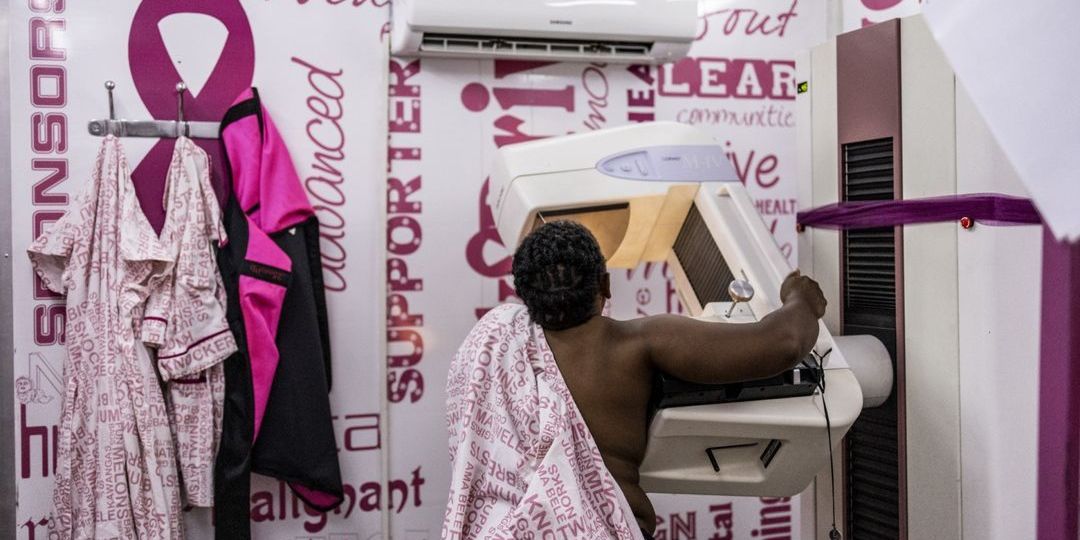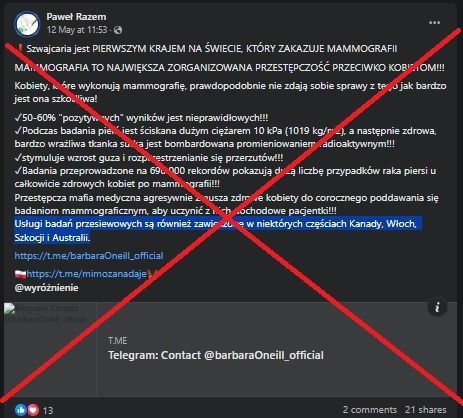
Mammograms are considered by healthcare professionals to still be the best way to detect the early stages of breast cancer and are performed all over the world, even if protocols vary by region. However, social media posts that spread misleading information about the procedure claim it has been banned in Switzerland and suspended in other countries. These claims are false. Swiss officials say mammograms are available nationwide and are the main method of early detection of breast cancer. This study is also recommended elsewhere cited in the posts.
“Switzerland is the first country in the world to ban mammography,” we read in a Facebook post shared on May 10, 2024 . “Screening services are also suspended in parts of Canada, Italy, Scotland and Australia,” the publication continues, which lists a list of false and misleading claims about the procedure. The post was also shared elsewhere, such as here .
It is not true to say that mammography is banned in Switzerland, as local scientists told AFP. Moreover, government websites of other countries mentioned in the false claim still recommend mammography.
Experts told AFP that claims about the risks of mammography are misleading or false and are based mainly on misinterpretations of available research.

Mammography still recommended in Switzerland
In an advanced online search , AFP was unable to find any official announcement by the Swiss government about a mammography ban. We contacted the Swiss Ministry of Health , which stated on May 14, 2024: “Switzerland has not banned mammography.” It said screening programs are run by 26 cantons or regions of the country.
“These rumors are completely untrue,” the Swiss Cancer Council confirmed to AFP on May 14 . The league recommends and supports mammography screening programs and “believes that the benefits of screening programs currently outweigh their disadvantages.”
Claims that Switzerland has banned mammography have been circulating online since at least 2014. These claims were likely based on a misinterpretation of the news that the Swiss Medical Council advised against systematic mammography screening in 2013 ( archived here ).
However, the Swiss Medical Council has never been an official government body. A now defunct organization that closed in 2022 . ( archived here ), analyzed medical treatments in terms of their cost-benefit ratio and provided non-binding policy guidance. Her recommendations to end systematic screening have been widely criticized by experts as based on erroneous, incomplete or misinterpreted data, such as here , here , here and here (archived here , here , here and here ).
Mammography has not been suspended in Australia, Italy, Scotland or Canada
Mammography screening is still recommended in Canada, Italy, Scotland and Australia.
The Australian Department of Health on its website (archived here ) states: “Women over the age of 40 can have a free mammogram every two years, and we invite women aged 50 to 74 for screening.”
The website of the Italian Ministry of Health (archived here ) states: “Screening for the early diagnosis of breast cancer is aimed at women aged 50 to 69 and is performed with mammography every 2 years. In some regions, the effectiveness of the test is tested in a wider range age, between 45 and 74 years of age.
The Public Health Agency of Scotland says (archived here ) that breast screening with mammography “is the best way to detect breast cancer early”.
“Women and some transgender or non-binary people aged 50 to 70 (up to their 71st birthday) receive invitations for breast screening once every three years,” the website reads.
The Canadian Cancer Society website (archived here ) provides links to all areas in Canada to locate a breast cancer screening program, except Nunavut, which states: “No organized screening program. Talk to your doctor.”
A Nunavut official (archived here ) told AFP that mammography has not been suspended in Nunavut and that mammography guidelines are based on regulations and recommendations from the Ottawa Hospital (archived here ).
Health authorities in other provinces confirmed the same .
Experts reject the alleged threats
AFP consulted experts, national health authorities and reviewed relevant scientific literature in November 2023 after seeing claims about the alleged dangers of mammography in several languages such as Bosnian , French , Finnish and Polish . According to data obtained by AFP, these claims were misleading or false , often based on incorrect interpretations.
For example, many social media posts claimed that more than half of positive mammogram results are false, in so-called “false positives.”
A March 2022 study (archived here ) from the University of California-Davis cites similar numbers when analyzing positive screening tests that led to further diagnostic work-up but did not result in a final diagnosis of breast cancer (archived here ).
But the term “false positive” is misleading, radiologist Paula Gordon from Canada’s University of British Columbia told AFP on November 5. This does not mean a misdiagnosis, she said. “It is used to mean a ‘false alarm,’ meaning that there were abnormalities observed on a mammogram that should be investigated further,” Gordon said.
“These are not misdiagnoses, these are calls for additional tests,” Aleksandar Ivković , a radiologist at the Neo-Mag diagnostic center in Niš, Serbia, said in an email to AFP on November 2, 2023.
Low radiation risk
Social media posts that criticize mammography also say that the pressure on the breast and the radiation that is sent to it are harmful.
This was rejected by Gordon, who said that although compression may be uncomfortable, it is important. “Pressure is necessary during a mammogram to expand the tissue and detect cancers, but also to enhance the breast so it requires less radiation,” she said.

A 2013 Swedish study examining whether compression could spread cancer cells found no evidence of this and concluded that mammograms are not dangerous (archived here ).
Gordon added that the level of radiation used in mammography is among the lowest of any medical examination. “It has decreased over recent decades and is well below the ‘acceptable’ level set by radiation protection organizations.”
Poland expands the scope of mammography
In Poland, the National Health Fund (NFZ) in November 2023 expanded the age group of women covered by free mammography tests to people aged 45-74 .
According to health service data, approximately 20,000 people are diagnosed with breast cancer in Poland. women per year.
